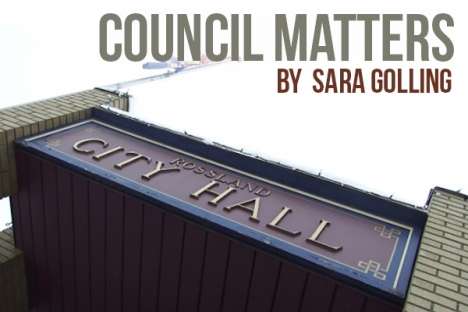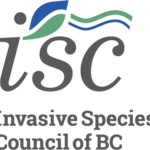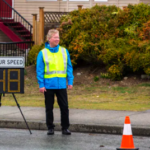More gold mining for Rossland? A new arts centre? Some rules for cannabis sales; and more.
Rossland City Council, May 22, 2018
Present: Mayor Kathy Moore, and Councillors Lloyd McLellan, Andy Morel, John Greene, Aaron Cosbey and Andrew Zwicker. Absent: Marten Kruyyse
Public Input Period: The public gallery remained seated and silent.
REGISTERED DELEGATIONS
Dan Wehrle and Mike Griffiths spoke to Council regarding Wherle’s Rossland area mineral claims being optioned to Currie Rose Resources Inc., represented by Mike Griffiths.
Dan Wehrle spoke first, explaining that he has built his career in Rossland since 1988, working at various jobs – and has staked a lot of claims here. He referred to Rossland’s history as a gold mining town; “I look at myself as part of the continuum.” He said he has worked diligently to keep things well cared for, and noted that most people don’t know what he does; he stated that he has worked hard to keep his claims out of the wrong hands, because he loves Rossland and wants to ensure that any company that takes over his claims will treat the community well.
Currie Rose Resources has now optioned his claims. He thinks that the company will be a responsible part of the community. He introduced Mike Griffiths, an Australian geologist, and Griffiths outlined his company’s expectations about their involvement in the community. Currie Rose Resources incorporated in 1973; Griffiths joined it in 2005; they were seeking gold claims in Tanzania at that time, but have sold those and have been seeking assets in Canada. He described several of the personnel in the company, and asserted, “We have a team at the top that has a conscience.”
Currie Rose expects to be drilling Rossland claims by the end of autumn, using local contractors wherever they can. “Finally, with respect to the community, we want to be seen as part of the community . . . we will be a good corporate citizen.” He declared, “We seek to have a very open and cooperative approach.” He indicated that there might be times when he could not provide an answer, but if so, he would explain why.
Cosbey asked what approach the company would take with regard to tailings; dry stack, or — ? Griffiths responded that they don’t yet know what will be necessary. Wherle noted that his claims almost surround the town, but that there are none in the settled area – “There’s no gold there.”
Moore noted that Rossland has very high environmental expectations, and values the surrounding trails and viewscapes very highly too, for recreational value for locals as well as for attracting visitors. She asked about the type of mining expected; Griffiths noted that open-pit mining is not an option. Moore also asked about the danger of more mine shafts, which resulted in the loss of a large area of trails formerly used recreationally on the slopes of Red Mountain, because of liability and safety concerns.
McLellan noted that there are a lot of fault-lines in the area, resulting in some promising veins ending suddenly. Moore thanked Wherle and Griffiths, who then stayed for the entire remainder of the public meeting.
Arts Centre proposal: Sarah Taekema and three of her colleagues provided a presentation regarding a proposal to open a multi-use arts centre in Rossland. The group proposes to start the arts centre in the old Drill Hall, as a social enterprise, to benefit local artists and the community as a whole. The plan would be to have a place for artists to work, to provide classes, a publicly curated gallery, additional space for Rossland potters, rentable space for performances, and more.
They point out that occupying the heritage building, which was built in 1904, would help to preserve it and rejuvenate it. The Drill Hall is large, and was most recently used for school space; the upstairs still has its original eucalyptus floor – an unusual feature. The potential to rent out space could help fund renovations. They have had good response to queries about the prospects for such a centre, from schools, the Rossland Council for Arts and Culture (RCAC), teachers, parents, the Rossland Museum and more. They plan to talk with the School District, which now owns it, and they’re talking with Columbia Basin Trust to develop their business plan.
Morel asked how they would plan to manage it without suffering volunteer burn-out. Taekema responded that the problems with the previous effort were the lack of a permanent space and that it was completely dependent on the efforts of too few volunteers; they plan to have a part-time administrator, and a strong board of directors.
Cosbey asked whether they have found out what renovations would be required to bring it up to code. Taekema answered that they are looking into that.
McLellan commented that there has been an assessment of the building in the past; he asked whether they want to own the building, or enter into a long-term lease. Taekema answered that they would like to “move it out of school district ownership” because the school district charges very high rents.
RECOMMENDATIONS FROM STAFF FOR DECISION
Development Variance Permit Application for 1957 Thompson Avenue, to place a two-block high concrete precast Lock Block wall on the property and vary the interior side setback from 1.2 metres to 0.5 metres. A motion to approve the application CARRIED unanimously.
Development Variance Permit Application – 2162 and 2178 Park Street, for two new homes on the properties, with the following variances for each lot; A reduced front setback from 4 metres to 1.25 metres – a 2.75 metre variance; a reduced interior side setback from 1.8 metres to 1.0 metre; an increased driveway width from 4 metres to 6 metres – a 2 metre variance; and that a snow easement is registered on each lot as shown on the application drawings.
A motion to approve the variances CARRIED unanimously.
Development Permit Application – Red Mountain Hostel
Council discussed a motion directing City to issue a Form and Character Development Permit for the proposed Red Mountain Hostel, subject to the usual conditions, including construction of a pedestrian path linking the base area with the Centennial Trail, and that all ski hill parking lost because of the hostel is replaced.
McLellan asked about the parking-space replacement requirement – will it happen? Don Thompson of Red Mountain Resort indicated that this summer they plan to add 85 spaces; Moore commented that previously they had indicated they would add 150 spaces.
Zwicker spoke about the Design Guidelines, and commented that he has heard people say the Josie Hotel is ugly and doesn’t “go with” the rest of the base “look.”
The two main differences between the guidelines and the hostel design are the flat roof, which Don Thompson commented is for safety reasons, and the amount of metal siding; Thompson commented that the siding is affordable, impermeable, and durable. (FireSmart also reminds us that metal siding is fire resistant.)
A motion to approve the Form and Character Development Permit CARRIED with only Morel opposed.
Cannabis Regulations
Council discussed what to ask staff to include in developing the draft bylaw to regulate cannabis outlets; whether to include the daycare as a space that cannot have a dispensary within 150 metres; whether smoking should be restricted in public spaces; whether dispensaries should be required to install alarms, special locks and cameras, and have safes; it was noted that the liquor store is not required to do those things. Various motions were proposed and voted upon, as follows:
Morel moved that Rossland limit the number of dispensaries to two; the motion FAILED 3 to 3.
Zwicker moved to limit dispensaries to one per block; that FAILED unanimously.
A motion to NOT impose any restriction on the number or dispensaries in town CARRIED; Council decided to let “market forces” determine the issue, as with any other retail operation.
A motion to remove the daycare from the zoning restriction area CARRIED; no one thought the toddlers would be in any danger of purchasing goods at a dispensary.
A motion to not include security requirements CARRIED; councillors were content to leave security up to the business owners, as it is in their best interests not to be robbed.
Council decided to leave hours of operation to the business owners, within provincial regulations.
Council discussed a motion to introduce a new rate class for the cost of a business licence, after CAO Bryan Teasdale explained that there may be higher costs to the City to vet the business. He also commented that Rossland would not impose a punitive fee designed to discourage that type of business. But the motion for a new rate class FAILED, with only Moore and Morel voting in favour.
Clean Air Bylaw: Morel moved that the City prohibit all smoking and vaping on Columbia Avenue and Washington Street, in the downtown core, for everyone’s health, especially children.
Cosbey seconded the motion “to get it on the floor” but admits that he likes the idea of a smoke-free street during the daytime at least. McLellan said he’d vote in favour because he’s anti-smoking, and Zwicker agreed. As for Ferraro’s staff who smoke in Harry LeFevre Square, someone commented that they could go down to the parking area to the south – it’s a short walk.
The motion CARRIED unanimously.
ON the topic of smoking on trails, Council did not move to lift the current restriction on smoking on trails; the restriction is for fire safety reasons.
2017 Additional Statements of Financial Information
The 2017 Supplementary Statements of Financial Information were presented, prepared in accordance with the requirements of the Financial Information Act.
A motion to approve the statements CARRIED unanimously. Moore thanked Manager of Finance, Elma Hamming, for being transparent about senior employees’ earnings, and the remuneration of Council members – that information is included in the reports.
Policy Review:
Gifts and Donations: Cosbey moved that the policy be revised to allow a tax receipt to be issued to an individual, but not to a business, because there is no financial advantage to an individual. The motion CARRIED. The concern has been that if the City issued a tax receipt to someone who does not qualify for one under the federal tax legislation – the Income Tax Act – the City could lose its ability to issue any tax receipts for any donations.
Streetlights. A motion that Council adopts the amended Streetlight Policy as presented CARRIED, with only McLellan opposed.
Retaining Elements and Landscape Features Encroachment; a motion tha Council re‐confirms the Retaining Elements and Landscape Features Encroachment Policy CARRIED.
Council discussed the Municipal Permissive and Revitalization Tax Exemptions. Discussion began with permissive tax exemptions: McLellan is opposed to the tax exemptions, and he felt that there is inconsistency in their application.
Cosbey stated that if Council is going to begin removing exemptions, they must do it according to a set of criteria. Moore noted that one community limits its permissive exemptions to 2% of its property taxation. Cosbey suggested a cap (for total exemptions) that equals a percentage of the previous year’s tax revenues.
Hamming noted that the City has been trying to get the exemptions onto a three-year cycle, so that applications don’t need to be made and dealt with by staff and Council every year.
Zwicker opined that the recipients of permissive tax exemptions contribute more value to the community than the tax exemptions cost the City.
A first motion to confirm the current policy FAILED 3 to 3, with Zwicker, Greene and Morel in favour, and Moore, Cosbey and McLellan opposed.
Cosbey moved that staff investigate the method by which a community now limiting their exemptions to a percentage of tax revenue implements their policy and report back to Council; the motion FAILED 3 to 3.
A motion to reconsider the motion to confirm the existing policy and to confirm it CARRIED.
Council then considered the Revitalization Tax Exemption Policy.
Cosbey agreed with Zwicker that he would like Council to have more flexibility to limit exemptions to the achievement of particular objectives, such as the development of businesses that diversify Rossland’s commercial base and encourage environmentally friendly changes.
Morel asked whether staff have any indications of how many businesses would not go ahead if they did not have exemptions. Zwicker stated that the City isn’t giving any money away – it’s helping businesses bring in more revenue to the City.
Moore queried whether the City would consider a revitalization exemption for a residence on the Heritage Register whose owner needed to renovate the home is such a way as to maintain heritage character.
Zwicker moved that the policy be amended to give Council greater flexibility regarding the percentage of each exemption and the length of the term and the conditions. Moore commented that she would like to have no exemption go longer than five years.
Teasdale and Cosbey both pointed out that objective guidelines are needed for applicants to have some certainty in their business planning.
Moore then commented that at first she had liked the idea of more flexibility, “and now I don’t like it any more!”
Zwicker’s motion FAILED 3 to 3.
Cosbey moved to allow exemption for “beneficial, green renovations for all building classes;” the minimum value of work to be done would have to be $10,000. Teasdale pointed out that having a number of applications for small amounts of tax reduction (in case the assessment increases only minimally) can increase the cost of staff time to process the applications — more than the citizens would gain from the exemption; it would not be cost-effective. Hamming pointed out that there are better tools available for encouraging green residential initiatives. The motion was not seconded, so it failed without a vote.
Cosbey moved to remove the ten-year maximum term and limit it to five years; that motion CARRIED unanimously.
Zwicker moved to put in place a scaled scheduled of tax increases from year 1, with a 100% exemption, and increase the amount paid each year, so that by year 6 the owners are paying 100% of the taxes assessed; the motion CARRIED unanimously.
Cosbey suggested one additional change about the check-list; he wants additional explanation provided about how the requirements for the exemptions are being met.
Additional Disabled Parking Stall Request: Council discussed a motion that would require improvements to the disabled parking stall on Washington Street across from the Legion. The motion FAILED; Cosbey moved to add it to next year’s budget and to consider other locations; that motion CARRIED.
BYLAWS:
a) Council Remuneration Bylaw No. 2666: A motion to adopt the bylaw CARRIED unanimously. As regular readers know, this will increase remuneration paid to the next council by 40%, which will bring it up to a little below the provincial average for communities of this size.
b) Ophir Reservoir Local Service Area Bylaw No. 2668: a motion to adopt the bylaw CARRIED unanimously.
c) Local Government Election Procedures Bylaw No. 2669, 2018; a motion to read the bylaw a first, second, and third time CARRIED unanimously.
STAFF UPDATES AND REPORTS
Council looked at the Updated Task List and the April 2018 Public Works Report; Moore asked how Spring clean-up is going. Andrew Bennet has been taking all the woody debris collected by the City so far, saving a lot of driving time and fuel, but there is a great deal more to be cleaned up than in previous years, which tends to cancel out the savings.
Council also examined the City of Rossland Water Consumption report for 2010 – 2018 and the April 2017 and 2018 Building Permit Reports; then, in response to the previous meeting’s delegation concerned about the incremental adverse effects on wildlife of the development, they considered the various provincial requirements that Red Mountain Resorts must meet before obtaining final authorization for the set of small overnight cabins proposed, and recently zoned by the City, for the area near Paradise Lodge.
Council had received a late letter, requesting permission to establish a native plant garden: a motion to approve the request CARRIED unanimously. The letter was not circulated to the press, so the proposed location was not clear – but time will tell.
Council then recessed to an in camera session, to discuss “negotiations and related discussions respecting the proposed provision of a municipal service.”
And your reporter lugged her laptop home, admiring the brilliance of the evening star poised above Mount Roberts – really the planet Venus, not a star – and wondering what the proposed municipal service might be. Affordable housing? A new City Hall? Both in one place? Or something entirely different? Eventually, many things will become clear. And Venus will shine on.


























